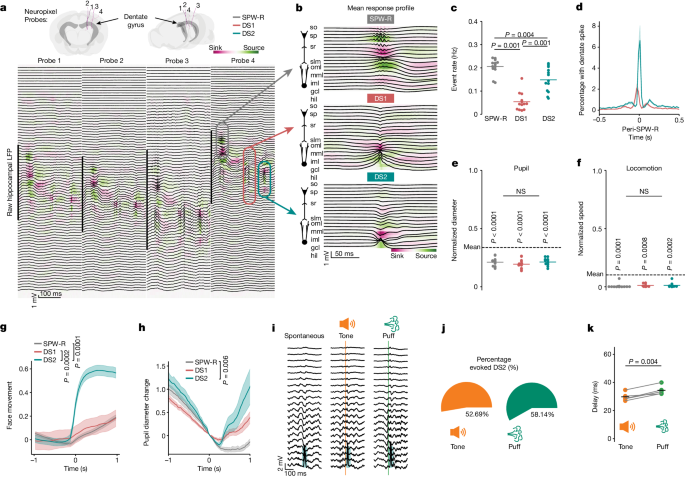Neural and Behavioral State Switching in Hippocampal Dentate Spikes
핵심 개념
The author argues that hippocampal dentate spikes represent a distinct brain state that supports memory formation during non-locomotor behavior, expanding cognitive processes beyond traditional offline functions.
초록
Distinct brain states, such as memory replay events during sharp-wave ripples in the hippocampus, serve specific cognitive functions like memory consolidation and planning. The hippocampal dentate spike, an understudied population event occurring between sharp-wave ripples, is associated with elevated firing rates and brief periods of arousal. Dentate spikes align with the mouse's spatial location and support associative memory formation, showcasing their role in memory processes during non-locomotor behavior.
요약 맞춤 설정
AI로 다시 쓰기
인용 생성
소스 번역
다른 언어로
마인드맵 생성
소스 콘텐츠 기반
소스 방문
www.nature.com
Neural and behavioural state switching during hippocampal dentate spikes - Nature
통계
Memory replay events occur during synchronous population events called sharp-wave ripples in the hippocampus.
Dentate spikes are associated with distinctly elevated brain-wide firing rates, primarily observed in higher order networks.
Inhibiting neural activity during dentate spikes disrupts associative memory formation.
인용구
핵심 통찰 요약
by Jordan S. Fa... 게시일 www.nature.com 03-13-2024
https://www.nature.com/articles/s41586-024-07192-8
더 깊은 질문
How do dentate spikes impact long-term memory retention compared to other neural population dynamics
Dentate spikes play a crucial role in long-term memory retention compared to other neural population dynamics such as sharp-wave ripples. While sharp-wave ripples are associated with memory replay events during offline states, dentate spikes occur between these events and are linked to elevated brain-wide firing rates, particularly in higher order networks. This distinct activity pattern during dentate spikes aligns hippocampal place coding with the mouse's current spatial location, facilitating associative memory formation. Inhibiting neural activity during dentate spikes disrupts this process, highlighting the importance of these population events in supporting long-term memory retention beyond traditional mechanisms.
What potential implications could the findings on dentate spikes have for understanding neurological disorders related to memory
The findings on dentate spikes could have significant implications for understanding neurological disorders related to memory function. Since dentate spikes contribute to associative memory formation and support cognitive processes during non-locomotor behavior, disruptions in this neural activity could potentially underlie deficits seen in conditions like Alzheimer's disease or other forms of dementia. By elucidating the role of dentate spikes in memory processing, researchers may uncover new targets for therapeutic interventions aimed at improving memory function and mitigating symptoms associated with neurological disorders.
How might studying dentate spikes contribute to advancements in artificial intelligence or machine learning algorithms
Studying dentate spikes has the potential to contribute significantly to advancements in artificial intelligence (AI) and machine learning algorithms. Understanding how these population events impact cognitive processes like associative memory formation can inspire novel computational models that mimic biological systems more closely. By incorporating insights from dentate spike research into AI algorithms, developers may enhance their ability to simulate complex cognitive functions related to spatial navigation, planning, and memory consolidation. This interdisciplinary approach could lead to more efficient and biologically inspired AI systems capable of performing tasks that require sophisticated cognitive abilities similar to those observed in living organisms.
0
